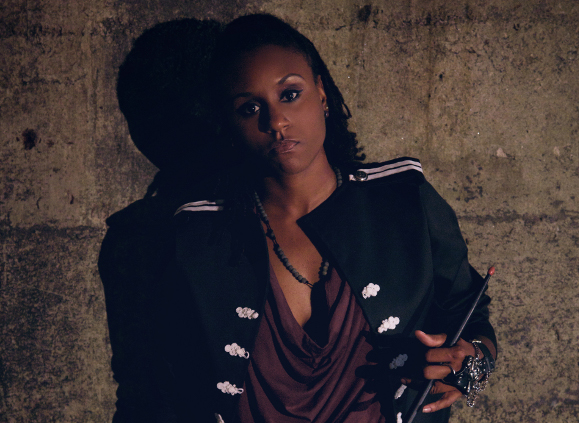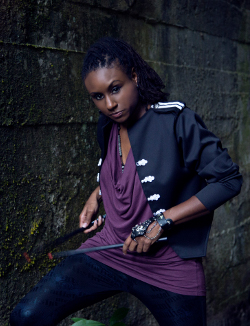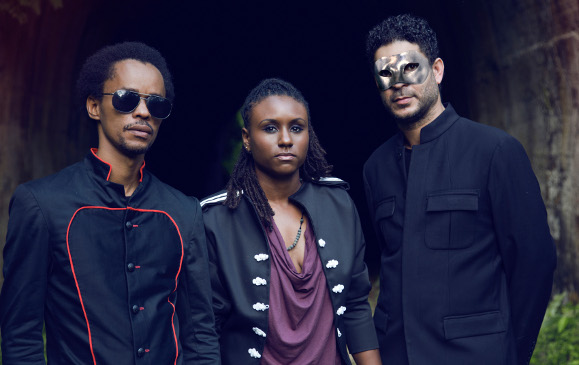Articles about reggae music, reviews, interviews, reports and more...
Interview: The Wizard
- Home
- Articles
- Interviews
- Interview: The Wizard

Interview: The Wizard
"Once we got a home studio, it was a wrap and I couldn't see myself doing anything else in life"
Sampler

Beres Hammond’s daughter takes reggae to a new level
Over the history of reggae music there have been some female producers, but few and far between. One of the most recent is The Wizard. She is the daughter of Beres Hammond and has worked with both reggae and pop artists, including Nelly Furtado, Kreesha Turner, her father and her cousin Courtney John. United Reggae got a chat with this shy and up-coming producer about growing up in a famous family and her cousin’s new venture The Courtney John Project.
A while ago I wrote an editorial in United Reggae Magazine about kinship in the reggae industry. The most well-known and most successful family is the huge Marley clan led by Ziggy, Stephen and Damian Marley. But there’s also Tarrus Riley – son of Jimmy Riley – and Christopher Ellis, son of the late and great Alton Ellis. The list could go on with successful children who regularly perform in front of thousands of people at festivals and concerts.
A child of another reggae superstar is Beres Hammond’s daughter Nastassja Hammond, in the music industry known as The Wizard, a name she got from her singing cousin Courtney John.
As a producer she’s more of a behind the scenes character, something that might suit her very well since she describes herself as somewhat of a recluse and introverted person. However, as the daughter of a Grammy nominee it’s naturally hard to entirely avoid the limelight, and over the years she has got more attention than she bargained for. But she doesn’t complain.
“It has mostly been positive – thank God he's a very likable man or it could have been a lot worse,” laughs The Wizard.
In the studio all the time
She grew up a musical family and since her father is Beres Hammond she was exposed to music every day, something she thinks influenced the way she feels about music.
“I used to beat on my lunch kit thinking I was playing drums and I found myself singing harmonies more than singing along to the actual melody of songs and that was around age six or seven, so it's something I knew I had a knack for and loved,” she explains, and adds:
“Once we got a home studio, it was a wrap and I couldn't see myself doing anything else in life.”
And according to a recent interview with her father on United Reggae she still occupies the Harmony House studio tapping the keyboard, playing the drums, singing and making music all day.
Her father was the one who made her fall in love with the idea of making music, and he used to take her to the studio with him.
“I was able to witness his musical genius first hand and it was an experience like no other. On a personal note – the fact that he was so passionate about something and really did follow his dreams made me feel like I really could do anything. The little rebel in me is a result of that,” she says, and continues:
“He has taught me that patience is virtue. Work hard and remain humble. Oh, and don't hustle the music – do it because you love it.”
Working with Beres Hammond
 Beres Hammond is a beloved artist all over the world and has inspired many artists over the years. This also goes for his daughter.
Beres Hammond is a beloved artist all over the world and has inspired many artists over the years. This also goes for his daughter.
“The way he sings with so much soul connects with people emotionally and spiritually, whether it’s about being in love or heartbreak. Whatever it is, you can feel what he's saying. His art of storytelling is so compelling – he paints a vivid picture of what he's singing about,” she states and continues:
“I aspire to be that way with production, not just songwriting but the actual music accompanying it. To be able to tell a story and it could somehow be the soundtrack to somebody's life.”
Father and daughter have also worked together and The Wizard produced the title track of his 2008 released album A Moment in Time. When it was recorded she was only 21 years old.
“I made that track about two or three years prior to actually presenting it to him. I've heard him on many different tracks, but never an ‘odd time’ track. It was a 3/4 jazz contemporary sounding piece, so I was very nervous to make him hear it because he's so picky. The fact that he liked it and wrote to it – I couldn't ask for more,” she reveals.
People are shocked
The music business is still dominated by men. Maybe even more so in the testosterone filled reggae and dancehall industry. There have been female reggae producers, and the most successful to date is Sonia Pottinger, who scored many hit songs in the 70’s with Culture, Marcia Griffiths, The Melodians, Delano Stewart and several others.
“Most people are shocked at first. A few people still find it hard to believe that I do actually make my beats,” she laughs, and continues:
“But that's ok. It’s positive though for the most part. When the initial shock wears thin then it becomes all about the music and gender doesn't matter.”
When you hear about song writers and producers they’re almost always men, even though some of the most popular artists today are women. On the week of November 24 both #2 and #3 on Billboard Hot 100 are held by women – Rihanna and Ke$ha. Rihanna is together with Adele probably two of the most successful artists – men included – in recent years.
More women in the industry
When I ask The Wizard about advantages and disadvantages of being a female in a male dominated industry, her first answer is something of a ploy.
“Better eye candy,” she laughs, and continues:
“The advantage working with males is that they're more willing to listen, and it’s easier to disarm their ego so to speak. With females I guess they feel more at ease because they don't have to be thinking about being harassed, so it’s easier to achieve the desired result.”
The Wizard hasn’t been exposed firsthand to the most common challenge most women face in the music industry – sexual harassment.
“I have my team to thank for that. It's been just about the music,” she says and adds that there are a few chauvinists that still have dated views on the roles of women.
“I think we're slowly moving away from that though. You see more women dominating creatively from Adele to Alicia Keys, Rhianna, Pink, Nikki Minaj, Florence and the Machine and Sia. More female writers and musicians. I'm seeing a lot of bands with at least one female playing an instrument, you never used to see that. So it’s slowly changing.”
Inventing new genre
Her latest venture is The Courtney John Project, a project that involves herself, Courtney John and keyboard player and song writer Stephen “Lenky” Marsden, probably best known for his smash riddim Diwali, a riddim that backed Sean Paul’s million selling Get Busy.
When working on The Courtney John Project the members have invented a sound called rootstronic, something of a musical oxymoron with its blend of dub, roots, electronic, R&B, hip-hop, dubstep, grime and classical.
“Rootstronic has a different vibe and is simply defined – roots is the foundation and tronic is the innovation. With the sound we always stay with the different elements that are indigenous to our Jamaican roots and fuse it with other sounds,” she explains and adds:
“It was Courtney John’s brilliant idea to create a unique brand to channel the music.”

Stepping out of the comfort zone
The Courtney John Project doesn’t sounds nothing like Courtney John or anything I’ve heard coming from Jamaica either for that matter. The closest that I can come to think of is Terry Lynn’s ground shaking Kingston Logic released some years ago. But according to The Wizard Courtney John is a daredevil.
“We vibe well together because he too is fearless creatively, and I rate him because he's always taking risks,” she says.
The aim of the Project is to expose the new sound, but also, and maybe even more importantly, to inspire and reassure other creative minds that it’s alright to try something different.
“It's a movement to relieve that creative fear not just within music but art overall. Whether it’s videography, photography, dance, theatre, fashion, whatever it is, it's ok to push the envelope,” she concludes.
Read more about this topic
Comments actually desactivated due to too much spams
Browse by categories
Recommended Articles
Latest articles
Recently addedView all
© 2007-2026 United Reggae. All Rights Reserved. Reproduction in whole or in part is prohibited. Read about copyright
Terms of use | About us | Contact us | Authors | Newsletter | A-Z














